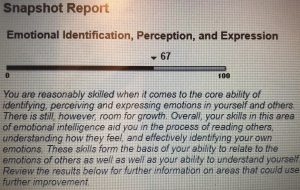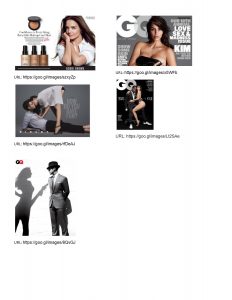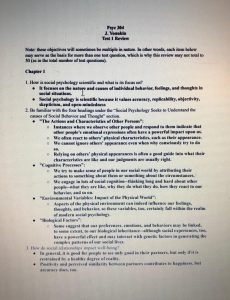Weekly Blog – Social
Blog 10:

(Link: https://images.app.goo.gl/RhViVwheNfwfxgd59) I chose this image because, like I said in my post, I gained critical thinking skills throughout this course in my thinking about the social world of psychology.
Compared to my first post and to what I know now and have put into practice, things haven’t changed too much. Social Psychology, to me, felt more like putting common sense of social realities into psychological terms. I felt that I was able to achieve the course objectives, although I would’ve liked to spend more time on the study of the research methods in order to be more familiar. My attitudes about Social Psychology have changed in that while I was simultaneously enrolled in the Cross-Cultural Psychology course, it felt that Social Psychology didn’t cover as much ground in terms of psychological explanations on a more diverse scale, similar to what Cross-Cultural Psychology accomplished for me. If I were to take the class again, I would purchase the textbook so that I could highlight, take notes, and write in it. I’ve grown academically by being able to think more critically about the balance between individual and collective realities. Professionally, I will be better at specifically naming behaviors and mental processes that occur in everyday social situations.
Blog 9:

(Link: https://goo.gl/images/nWq5st)
Three major things I learned about in this course is the discomfort humans have with complexity, thus, creating heuristics, the simplicity that is often associated with racism, and that the results I receive from questionnaires provided to me often result in lower scores than I anticipate. In my 8th blog post, I discuss how believing one “supposedly evolutionary” reality can lead us to be more open to potential realities that we might not and maybe shouldn’t be comfortable with. Similarly, in my 3rd assignment and assignment takeaway, I discuss how if we believe that racism is based solely on explicit action or events, then we will continue being comfortable with ignoring some of the more important sides of racism, which will ultimately allow its continuation. In my philosophy course that I took last semester, we discussed logical fallacies such as the post hoc ergo propter hoc fallacy which means that one is concluding that because something happened before something else happened, that initial something must have caused the other thing to happen. This reminds me of the chapter including heuristics and the image that I included for assignment takeaway post where the character is saying that he will never fly again because he is reading about an airplane crash in the newspaper.
Blog 8:

I disagree with this article completely. To start, I’d be curious, as they didn’t list them, what genes they were talking about that lead to men being predisposed to having sex widely rather than wisely. I think accepting the evolutionary argument in this article, though it says this is not the case, can easily lend to believing the myth that “boys will be boys” and are, therefore, genetically formed to want more sex with more partners. This can then transfer easily to a belief that very few of us, I hope, are willing to accept. Men upset women by being unwilling to take responsibility for their own unchecked ego and women upset men because they are equal.
Blog 7:

The relationship between Emotional Intelligence and Self-Regulation seem to consist of an awareness of emotions and an ability to control and maneuver those emotions. To me, emotional intelligence means being self-aware, moment by moment, of how one responds emotionally to outside stimuli. Emotional intelligence also consists of being aware of how others might be feeling and how to best approach receiving their current emotional state. The way that I specifically express my emotional intelligence is mainly through understanding and empathizing with the emotions of others. I could improve greatly on being aware of my own emotions in any given moment. I often don’t realize them until they are so present that I cannot ignore them.
Blog 6:

Each of these photos represent a more modern concept of what Jean Kilbourne talked about in Still Killing Us Softly. The first image, though it supports female confidence, still does so with the message that that confidence is found through the purchase and use of a product that conceals the natural state of women’s bodies. The second image displays the woman as being faceless, teasing the man with objective sexuality, and being “fun” in a way that satisfies the man. The third image strips the woman in the image of all humanity by simply only showing her shadow that is focused mostly on her figure. The fourth picture displays Kim Kardashian as the “ideal” sex symbol with titles surrounding her about similar topics. The fifth image does a similar job communicating that women add to the aesthetic of an image simply because of their physical form. This was as interesting blog post for me because I have done a lot of personal research into the topic of gender scripts and norms communicated through mass media. So, to answer the question, yes, I have noticed these trends before watching this video. The video helped me recognize that these issues are certainly not isolated to our modern era and they are certainly not being fought against just in the past few years, so the saying, “it’s 2019, you can’t say that anymore” becomes extremely irrelevant in light of Jean Kilbourne’s video.
Blog 4:

Through this process of looking back over my test results and correctly answering the questions that I got wrong, I learned that I should broadly read the section surrounding the content that the study guide encourages you to focus on and be familiar with. I think that if I had done this, the questions that I had trouble with would have had a little bit more context in my mind. As I read through the chapters during their assigned weeks, I would go back and quickly summarize each section with the points that I thought were most important. The week prior to the test, I spent time going through each chapter with the study guide, studying about a chapter a day. I think if I went through the study guide not just once, but multiple times the week prior to the exam, I would have done much better and been more fluent with the material. I think that taking the exam, reviewing the answers that I got wrong, and learning about the correct answers will benefit me as I now know the basic structure of the exam, I know that context is important with memory, and repetition will improve my memory storage and retrieval.
Blog 3:
This article very accurately discusses the connection between music and attraction that I have noticed for some time. I believe this is inevitable in some way. Similar to the books that people choose to read, I believe that music is a way that each of us can discover meaning and purpose, but even more so than books because of the emotions that musical composition can invoke. My wife and I, though we might not listen to the exact same artists, certainly spend a significant amount of time showing each other new music and connecting over what we do and don’t like. Through this interaction, we have come to both appreciate and mainly listen to the same type of music. Obviously, both of us share very similar values and ideals.
My Soundtrack:
My wife: Hands Down by The Greeting Committee
My dad: The World’s Strongest Man by Balance Problems
My mom: Atlas: Two by Sleeping at Last
My brother: Brother by Lord Huron
My sister: I Wanna Dance with Somebody (Who Loves Me) by Whitney Houston
My dog: The Weight of Loss is Whole by Braveyoung
The students that I work with: Tonya Harding (in Eb major) by Sufjan Stevens

Blog 2:

I chose this image because I felt that I was more honest in my assessment of myself than I normally am with tests like this.
For a long time, I was extremely uninterested in being a student in higher education courses. The sooner I finished high school and my Associate’s Degree, the better. I never felt as though I was learning anything that I could then take with me into the real world. After receiving my AD, I took a couple of years off from being a student. This is when I started working at the public middle school as a special education teaching assistant. And now that I have a hands on working experience where I can implement what I learn in my psychology courses, I hope that I am a mostly driven, curious, and thorough student who is still working through previous habits of procrastination and poor time management. My confidence is not necessarily high due to a past of a few failed courses that felt irrelevant to me and low motivation without a goal in sight. I believe that if I actively apply and examine the research I learn through these courses in my current job, my past of low motivation and lacking relevance will no longer prove to be constraining. My self-efficacy results, I think, project a common theme of fear that what I am interested in is not worth while and, therefore, is not worth dedicating time and effort to. However, my scores show that I do heartily believe that my ability can grow with substantial effort.
Blog 1:

Link: https://goo.gl/images/tqyuog (Middle school is often the time and location of our most uncomfortable and awkward years. I hope this social psychology course will equip me with the proper tools to assist making that time a little better for some people.)
I believe that the study of social psychology will greatly benefit me in the field that I work. From my experience, middle school is the epicenter of social learning and development where who we decide to be, the people we choose to hang out with, and the activities that we’re involved in ultimately decide much of who we are later on in life. If I don’t have a clearly painted picture of the processes that my students are going through as a staff member who is encouraged to build relationships with students, my ability to empathize and engage with them will be extremely hindered. My hope in this course is that I gain knowledge about the importance of social life among middle school students and people in general, insight into the development of attitudes and behaviors within and towards social groups, and to ultimately develop a deeper understanding of what it means to be a social being.